Helping Animals in the Footsteps of the Buddha
Written by: Eileen Weintraub
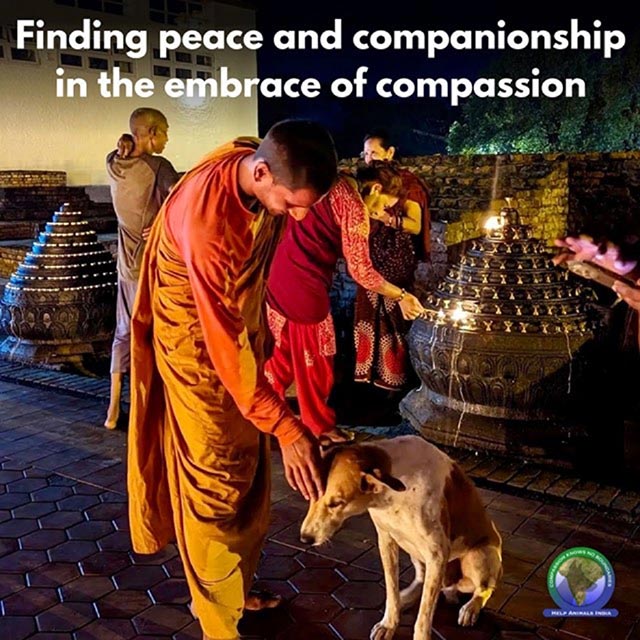
Monks in Lumbini, birthplace of the Buddha, responding with compassion to animals’ needs.
Photos: Courtesy Help Animals India
Help Animals India is increasing its support of animals in Lumbini, where the Buddha was born. This is part of its ongoing work supporting animals at other sites sacred in Buddhism, as well as at many other places in India.
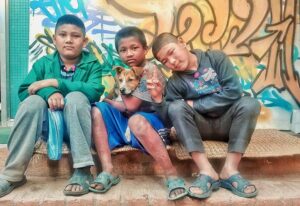
The Seattle-based 501(c)(3) non-profit raises funds to help animals and the people who love them, through supporting efficient and effective animal protection organizations in India and Nepal. Here is a recent newsletter.
In Bodhgaya, where the Buddha obtained enlightenment, Help Animals India gives yearly grants to MAITRI, a charity affiliated with the late Lama Zopa Rinpoche. MAITRI was started and is run to this day by a dedicated Italian woman, who supports projects for both impoverished people and suffering animals.
In the state of Bihar, Bodhgaya is one of the four holiest sites in Buddhism, along with Lumbini, Kushinagar, and Sarnath.
Siddhartha Gautama, a prince from the Shakya clan, came to Bodh Gaya in search of enlightenment. He sat in meditation under a bodhi tree, and after seven days and nights of deep contemplation, finally attained enlightenment. He became known as the Buddha, which means “the awakened one.”
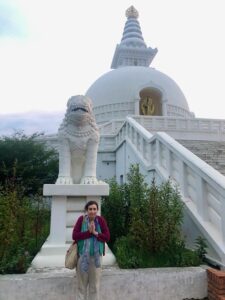
The work in Sarnath started in 2012, when Eileen Weintraub, founder of Help Animals India, asked contacts in India to check on the feasibility of having animal birth control and rabies vaccination drives in that village.
Friend and Buddhist nun Jangchub Zangmo had seen the incredible suffering of the animals there, particularly the community dogs, when she visited the Buddhist pilgrimage site where Buddha first taught his message of compassion for all.
The first birth control camp was completed successfully in 2012. A comprehensive plan was devised to turn the village of Sarnath into a model community for dogs and people, by staging successive camps each year to keep the population of the dogs under control, and therefore to create a healthy and happy community for dogs and villagers to live together.
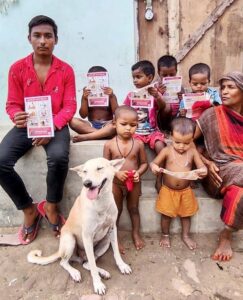
A camp now happens each year, funded by the Brigitte Bardot Foundation in France, and by Help Animals India donors. Sarnath is now a model village for animal welfare, supported by the community and by volunteers!
The Buddha’s first destination after awakening was Sarnath, a deer park located near the sacred Indian city of Varanasi. It was here, around 528 BCE, that the Buddha delivered his first sermon.
In Lumbini, Nepal, where the Buddha was born, Help Animals India founder Weintraub in 2022 spoke several times at the Himalayan Vegan Festival in Kathmandu, Pokhara and Lumbini. The festival was co-sponsored by Help Animals India. Here is information on veganism and climate change.
We were helping to spread the message of compassion for all creatures. While the speakers all forcefully pled the case for veganism, quite another story revealed itself on the streets of India and Nepal, with cows and buffaloes roaming everywhere (many, sadly, destined to be illegally trafficked to the meat trade), and goats and chickens barbarically kept, awaiting slaughter.

Though vegetarianism is commonplace in this part of the world, plant-based milk and dairy alternatives are still limited or nonexistent. Meanwhile, our partner charities are doing their best to advocate for “diet change to stop climate change.”
In one of her talks, Weintraub said, “Pancha Sila, which are the five principles of virtues to be followed by Buddhists, includes refraining from killing any living beings as its first principle. This is conceived as the principle of ahimsa (non-violence).
“What does this virtue mean? Is it limited to not directly killing non-human animals? Where does the realm of ahimsa begin and what is its relevance with our diet in the 21st century, as much of animal agriculture has been commercialized and industrialized?
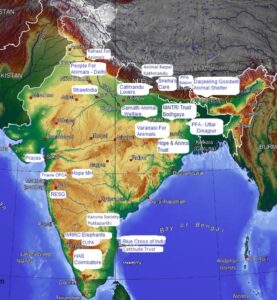
“As profit-driven factory farming is rising throughout Asia, we now understand the comparatively huge amount of environmental resources that are being used to produce nutrition through animals, as the planet struggles to feed nearly 8 billion people.”
We discussed how eating fewer resource-consuming sources of nutrition, such as eating more plant-based foods, relates to daily practiced Buddhist principles in the 21st century.
Lumbini is now a major pilgrimage site for Buddhists from all over the world. The Mayadevi Temple, which marks the spot where the Buddha was born, is one of the most important pilgrimage sites in Buddhism. The temple is a UNESCO World Heritage Site.
Seeing the poor suffering animals of Lumbini wandering the street uncared for, was something that needed to change!
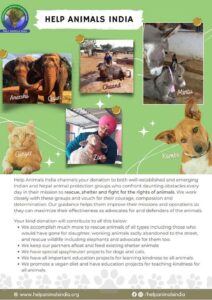
Many unwanted cattle (males that cannot give milk, and older spent females) are dumped there from other area with the idea Buddhists won’t slaughter them, if they are not carted off for slaughter by unscrupulous dealers. I saw these poor beings wandering around aimlessly, not knowing where to go or what to do.
The community dogs were not fixed, and were reproducing and unwanted. Rabies is a big risk to humans and other animals too. So now through our Nepal partner “Animal Nepal,” we are spaying and neutering the community dogs, and networking with the monasteries to provide gaushalas (cow shelters) for the cows! We’re inspiring the local monasteries to have more programs for the animals!
Despite some of the best animal protection laws in the world, and a renowned heritage of reverence for life, modern India is a country where millions of animals suffer severe neglect or abuse.
Overpopulation, poverty, pollution, superstition, apathy and ignorance all contribute to their plight. In a country where human misery and impoverishment remain high, the welfare of destitute animals is a low priority.
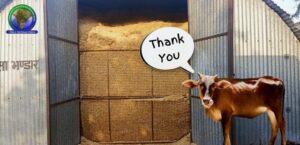
However, India’s animals have strong local allies, who are dedicated to their animal welfare organizations.
Help Animals India seeks out the best of these under-funded organizations, to provide financial and practical assistance where it can make the most difference. We strive not only to achieve immediate benefits for India’s animals, but also to nurture an enduring culture of animal protectionism. Here’s our 2023 appeal, and a message looking into the future of our work.
We strive to put our donors’ contributions to work where they are most needed, and can do the most good. Help Animals India develops close relationships with the NGOs, and thereby ensures all donations given are handled transparently, and do the most good.
Eileen Weintraub took Tibetan Buddhist refuge in 1976, and has been extremely fortunate to meet and practice with many of the great lamas of our time. She is a lifelong animal advocate/rescuer, and in 1998 she began supporting animal protection groups in India.
During her trips to India Weintraub found many groups that were helping animals despite having few resources, so in 2008 she founded Help Animals India to give them better financial support. Because of this work, Weintraub won the 2016 Unsung Vegan Heroes Award from The Pollination Project. She lives in Lake Forest Park, north of Seattle, with her husband Mark Johnson.
